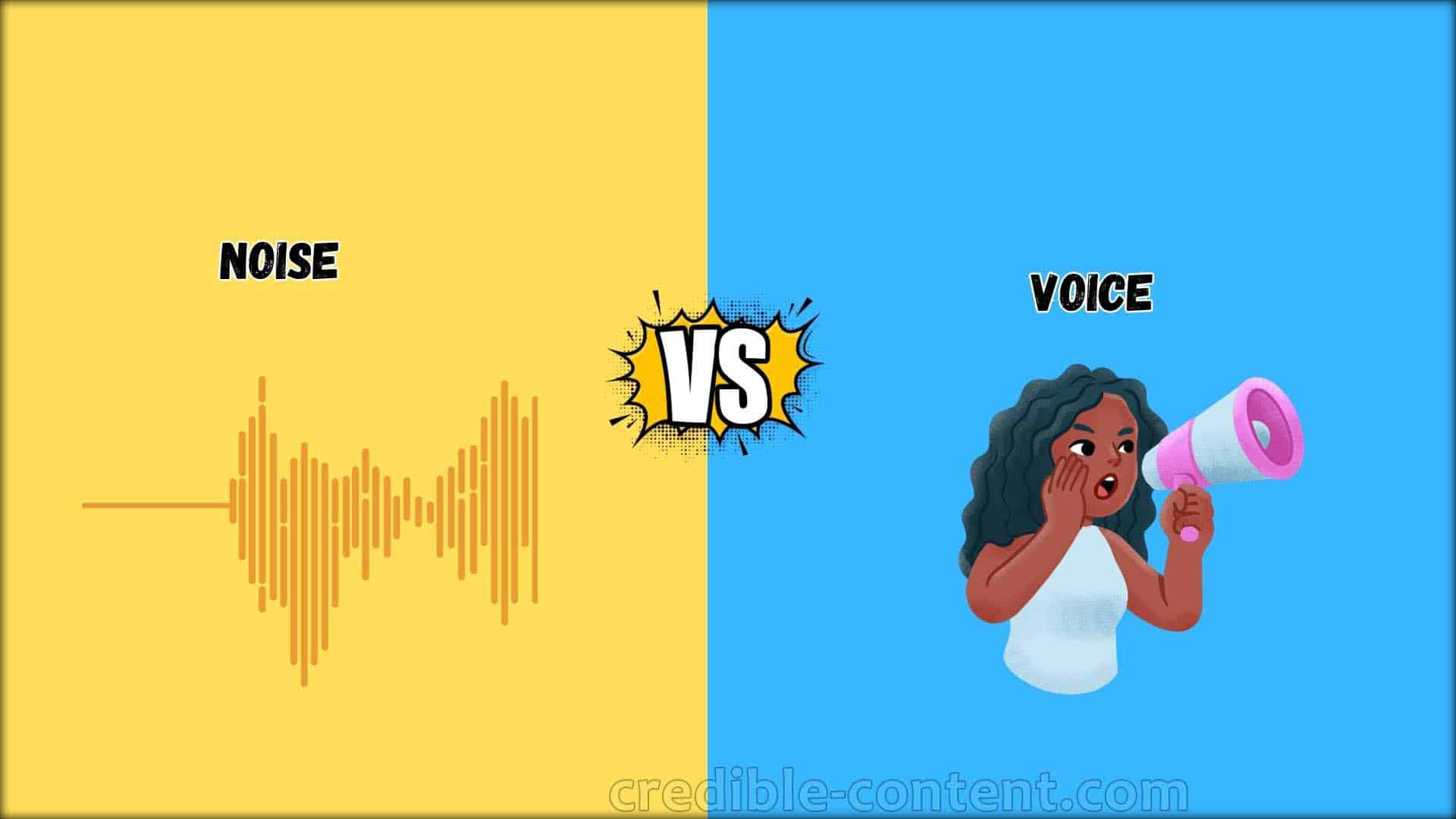
Is your content noise or voice?
In a hurry to improve SEO for all possible keywords, sometimes we forget to differentiate between noise and voice when writing content.
Does your content have a voice or is it simply a noise?
The content that is simply noise adds no value.
It may attract people to your website because after all, search engine algorithms are not perfect, but once they are on your website, they cannot figure what you’re trying to say.
They leave your website disillusioned.
Sometimes so disillusioned that they make a mental note never to return to your website.
The content that is just noise is a waste of your time and money.
Instead, write and publish content with a distinctive voice.
The “noise” content is of low quality.
Low-quality content turns your content into noise. What are the traits that tell you that you’ve got low-quality content?
- Your search engine traffic doesn’t increase.
- Even if your search engine traffic increases, your conversion rate remains poor.
- Nobody finds it useful, relevant or topical.
- Your repeat traffic is very low.
- Nobody promotes your links but you.
- Not many people link to your blog or website.
- Nobody talks about what you publish.
- Even if people promote your link, it is due to some controversy regarding your views or opinion.
The “voice” content on the other hand is high quality content.
What features of your content make it a voice?
- It improves your search engine rankings for relevant keywords.
- Your visitors find your content useful and they subscribe to your RSS feed updates or email newsletter, if available.
- People share your links with their visitors, followers, friends and colleagues using social media and social networking websites and they respect your opinion.
- The other bloggers and publishers love to link to your content as valuable reference.
- You are eventually able to establish your authority.
How do you end up writing and publishing “noise content” instead of “voice content”?

How do you end up writing meaningless content that is just noise?
Nobody purposely wants to write and publish junk content.
Well, almost nobody.
I have come across clients who proudly say that they don’t care what type of content they publish as long as they get traffic.
They think that if they can attract 10,000 visitors to their website and even if 10 visitors turn into customers, they are happy.
First of all, attracting 10,000 people is not as easy as it seems.
Even if somehow, you attract 10,000 people with irrelevant content, converting even 10 is a big problem.
Getting money from people is one of the hardest tasks to achieve.
People buy from you when they stay on your website and consume the information you have published.
They pay you money when they trust you.
With lousy, low-quality content, how do you make them stay on your website?
When you mislead them to your website, they feel betrayed and leave immediately.
When people quickly leave your website without reading your web page or without exploring further, it sends negative signals to Google.
Google knows how much time people spend on your website after finding your link in search results.
Even if initially your link enjoyed higher search engine rankings, as people spend less time on your website after finding that particular link, its rankings begin to thank, unless, it completely vanishes from the results.
It is not just misleading content that is meaningless noise.
Even content that is not relevant to your target audience is noise for them.
If I want to attract web design agencies that are looking for a content writer, it doesn’t mean I start publishing web design tutorials.
When people come to my website they don’t expect web design tutorials. They want to know if I can write content for their websites.
This leads them confused. My content becomes noise.
How to develop a unique voice for your content?

How to develop unique voice for content writing?
Here is a quick list of steps you can take to develop a unique voice for your content:
- Understand your target audience and their preferences.
- Define your content’s purpose and goals clearly.
- Conduct thorough research to gather relevant information.
- Inject your own personality and experiences into your writing.
- Develop a deep understanding of your niche or industry.
- Read widely to expand your knowledge and vocabulary.
- Experiment with different writing styles and tones.
- Use storytelling techniques to engage and captivate readers.
- Incorporate humor, wit, or sarcasm when appropriate.
- Create a consistent brand voice that aligns with your organization’s values.
- Break traditional rules of grammar and syntax for creative effect.
- Use metaphors, analogies, and vivid imagery to paint a picture in readers’ minds.
- Incorporate personal anecdotes and real-life examples to add authenticity.
- Write conversationally, as if you’re speaking directly to your audience.
- Avoid jargon and technical language unless your audience is familiar with it.
- Show empathy and connect emotionally with your readers.
- Add a unique perspective or angle to your content.
- Take risks and challenge conventional thinking.
- Edit and revise your work to refine your voice over time.
- Seek feedback from readers and colleagues to continuously improve.
Benefits of developing a unique voice for your content writing

Benefits of developing a unique voice for content writing.
Developing a unique voice for your content writing is crucial.
It sets you apart from the rest.
It grabs attention.
It captivates minds.
It leaves a lasting impression.
It creates brand identity.
It builds trust.
It establishes you as a thought leader.
Listed below are the primary benefits of developing a unique voice for your content writing.
- Differentiation: A unique voice sets you apart from competitors, helping you stand out in a crowded content landscape.
- Brand Identity: It establishes a distinctive brand identity, making your content instantly recognizable to your audience.
- Memorability: A unique voice makes your content memorable, increasing the chances of readers recalling and sharing it.
- Connection: It creates a stronger connection with your audience, fostering loyalty and building a community around your brand.
- Engagement: A unique voice captures readers’ attention and keeps them engaged, leading to longer reading sessions.
- Trustworthiness: A consistent and authentic voice builds trust with your audience, positioning you as a reliable source of information.
- Emotional Appeal: Developing a unique voice allows you to evoke specific emotions, making your content more impactful and relatable.
- Different Content Formats: A distinctive voice can be carried across various content formats, including blog posts, videos, podcasts, and social media.
- Amplification: A unique voice increases the likelihood of your content being shared and amplified by your audience.
- Thought Leadership: It establishes you as an authority in your industry, enhancing your credibility and attracting opportunities for collaboration and partnerships.
- Audience Connection: It helps you connect with your target audience on a deeper level, understanding their needs and interests better.
- Consistency: Developing a unique voice ensures consistency in your messaging, reinforcing your brand values and core beliefs.
- Increased Engagement Metrics: Unique voices often lead to higher engagement metrics such as likes, comments, and shares.
- Improved SEO: It can contribute to better search engine optimization, as it adds originality and relevance to your content.
- Brand Recognition: When it becomes synonymous with your brand, it strengthens brand recognition and recall.
- Increased Conversion Rates: It resonates with your audience and leads to higher conversion rates, driving business growth.
- Enhanced Storytelling: A unique voice allows you to tell stories in a compelling and memorable way, making your content more engaging.
- Niche Dominance: Developing a unique voice helps you establish dominance in your niche, making it harder for competitors to replicate your success.
- Long-Term Sustainability: It becomes a long-term asset for your brand, enabling you to maintain relevance and adapt to changing trends.
- Content Versatility: It can be applied to a wide range of content topics and formats, giving you flexibility and versatility in your writing.
- Personal Satisfaction: Developing a unique voice allows you to express your creativity and individuality, bringing personal satisfaction to your work.
- Improved Audience Loyalty: When readers connect with your unique voice, they are more likely to become loyal followers and advocates for your brand.
- Increased Social Proof: It can attract positive feedback and testimonials, providing social proof of the value you deliver.
- Enhanced Shareability: Content with a unique voice often resonates with readers, increasing its shareability and potential virality.
- Competitive Advantage: It gives you a competitive advantage, helping you succeed in a crowded digital landscape by creating a strong and lasting impression on your audience.
Disadvantages of writing and publishing content that is simply useless noise

Pitfalls of publishing useless content.
Publishing low-quality, meaningless content on your website leads to numerous disadvantages.
It repels visitors.
It diminishes credibility.
It damages brand reputation.
It compromises customer trust.
It increases bounce rates.
It lowers engagement.
Aside from these, I’m listing major disadvantages of writing and publishing content that is simply useless noise.
- Loss of credibility: Low quality, meaningless content erodes your credibility and undermines trust.
- Negative brand perception: It reflects poorly on your brand, projecting a lack of professionalism and expertise.
- Poor user experience: Readers will be disappointed by content that offers no value or fails to address their needs.
- High bounce rates: Visitors will quickly leave your site if they encounter irrelevant or unhelpful content.
- Reduced organic traffic: Search engines prioritize high-quality content, so publishing low quality material can harm your visibility and rankings.
- Limited engagement: Meaningless content fails to capture attention, resulting in low engagement metrics and missed opportunities.
- Lack of social sharing: Readers won’t feel motivated to share content that adds no value or contributes to the noise.
- Negative word-of-mouth: Readers who encounter low quality content may share their disappointment, spreading negative feedback about your brand.
- Decreased conversions: Compelling content plays a crucial role in driving conversions, while meaningless content fails to inspire action.
- Missed lead generation opportunities: Valuable content attracts prospects and encourages them to provide their information, but low-quality content won’t entice them to engage further.
- Loss of competitive advantage: Publishing noise-filled content puts you at a disadvantage compared to competitors who offer valuable, high-quality material.
- Damaged brand reputation: A reputation for publishing low quality, meaningless content can be difficult to shake off and may impact your brand in the long run.
- Wasted resources: Producing content that lacks meaning or quality is a waste of time, effort, and resources that could be better utilized elsewhere.
- Poor audience retention: Readers won’t return to your site if they consistently encounter low quality, meaningless content.
- Missed opportunities for thought leadership: By publishing meaningless content, you miss the chance to establish yourself as an authority in your industry.
- Limited customer trust: “Noise” content fails to demonstrate your expertise and ability to solve customer problems, hindering the development of trust.
- Negative impact on conversions: If your content fails to resonate with readers and provide value, it won’t effectively guide them through the buyer’s journey, resulting in lost conversions.
- Lowered brand differentiation: Publishing low quality content contributes to the noise in your industry, making it harder for your brand to stand out.
- Negative impact on customer satisfaction: Meaningless content fails to meet your audience’s expectations, leading to dissatisfaction and a negative perception of your brand.
- Missed opportunities for growth: Quality content is an opportunity to attract new audiences and nurture existing ones, while meaningless content prevents you from expanding your reach and impact.
When it comes to writing content for your website and blog, developing a unique voice is important. People distinguish you with your voice. It sets you apart.






